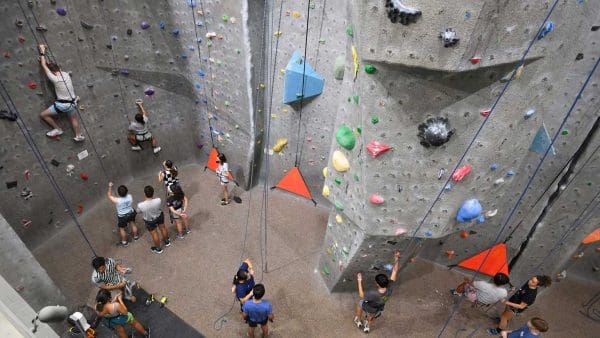
Rachelle Hernandez became vice provost for student affairs in spring 2022 following more than 25 years in higher education. Hernandez oversees a broad portfolio including student life and leadership development, the Center for Social Concern, the Center for Student Success, housing and community living, dining, athletics and recreation, and student conduct.
What common thread runs through your work?
We approach everything from a student success lens, which allows us to tie together academic, extracurricular, and co-curricular success. When students feel like they’re part of the community with a strong sense of belonging, everything else works that much better. Take the example of Dining Services: Having food that’s healthy and honors students’ cultural identities makes students feel a part of the community, so Dining Services’ theme is cultural authenticity. Food that is familiar can be really important to helping a student feel like they’re at home. They go on to class and feel like, “This is my university.”
How do you balance building foundations for students with crisis management?
When we put energy into removing friction for students, clearing the runway, that helps reduce issues later on. We keep student development at our core, teaching students how to deal with the unexpected, while ensuring there are systems in place to support them. One of the strongest skills we can instill is how to ask for help—no one gets through life by themselves.
Are Hopkins students different from other students you’ve worked with?
They care very deeply about each other. When you talk with a student group, they bring up other groups and how they can collaborate and find mutual benefits. They’re interested in their own goals, but they’re always thinking about others as well: “It’s not just my thing, it’s what does this mean in the world? And how do I help make it mean something?”
What was life like for you as an undergraduate?
I grew up in a very small town— Cannon Falls, Minnesota—so I participated in a lot of different activities, because things didn’t happen unless everyone participated. That translated, when I went to college, that being a part of the campus meant being engaged. I was a Pell grant student [for students with exceptional financial need], and now I get to work with others to make sure that students don’t have to struggle to find community and support.
Is there an experience you had as a student that shapes your approach?
A professor did something that will stick with me forever. In a large lecture class, he took a picture of everybody, and by the second week he knew everyone’s name. That taught me the importance of feeling seen. He conveyed that our ideas mattered, so he helped to form my interest in the scholarship of academic belonging and identity, without my even knowing it at the time.




